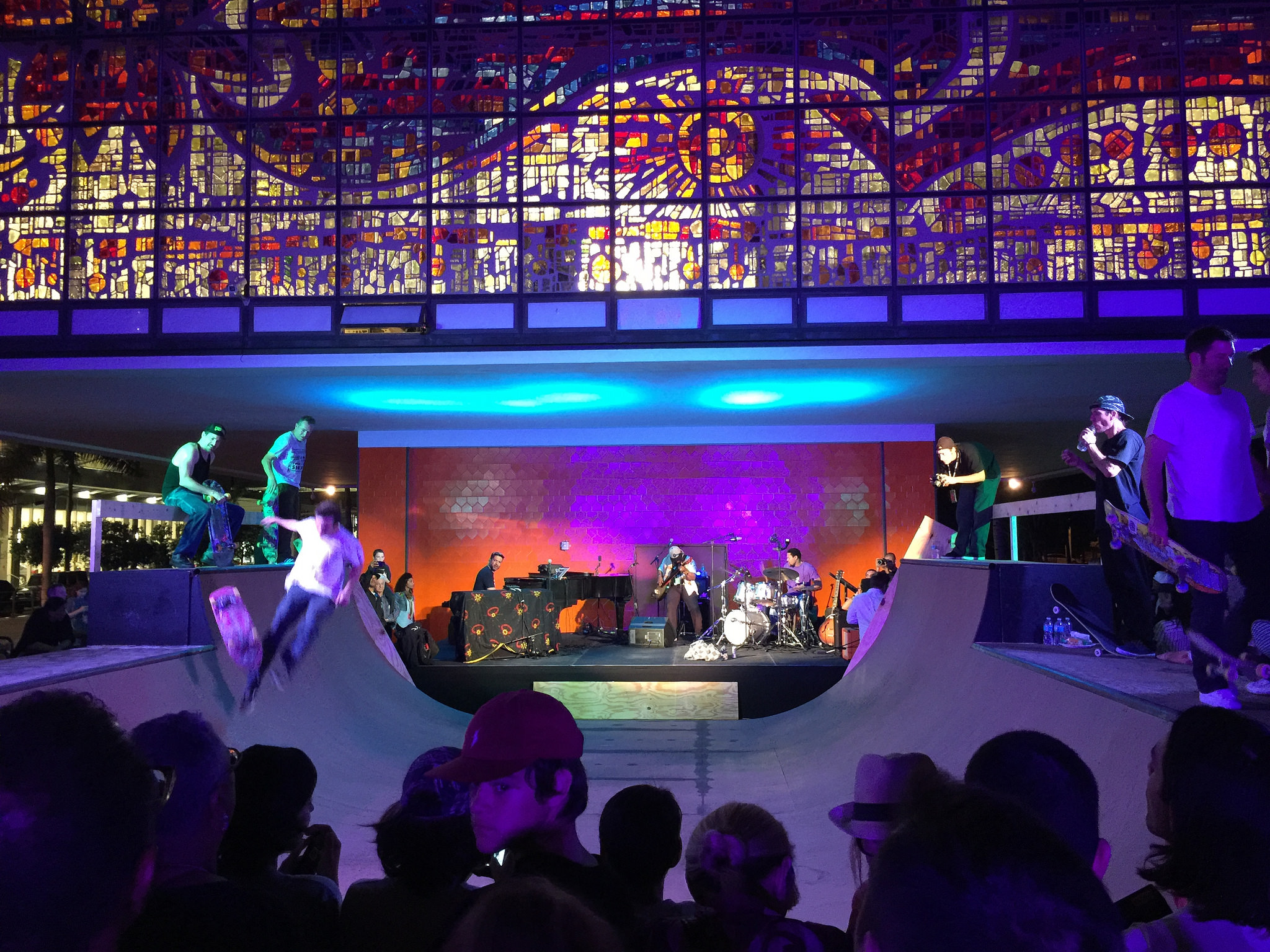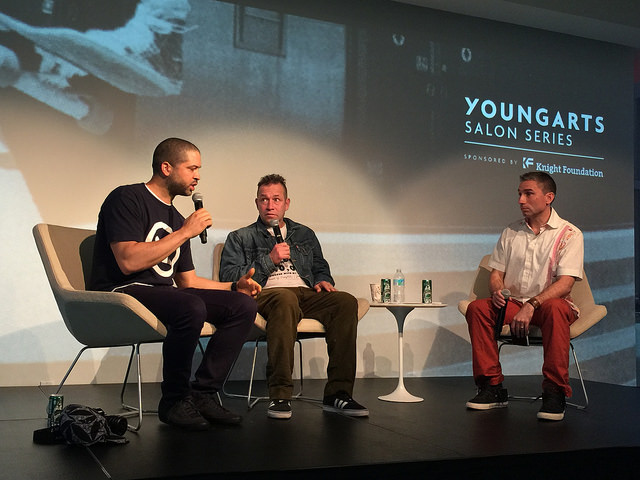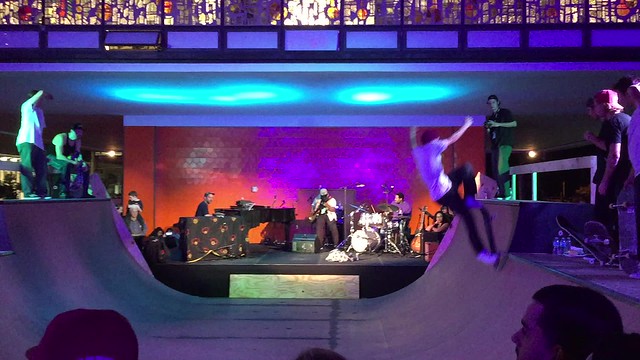
How skateboarders and jazz musicians make the same moves
Skateboarders perform in a half-pipe on the National YoungArts Foundation campus in Miami as jazz pianist Jason Moran and his band perform. Photo: Michael D. Bolden on Flickr.
Jazz is an art form informed by paradoxes: Improvisation is shaped by meticulous planning; freedom is built off respect from an ever-present canon; individuality, encouraged and celebrated, only truly succeeds when balanced against the needs of the music and the group. And then, to yield its rewards, jazz demands from players and listeners a willingness to take chances, to embrace uncertainty, enjoy the fleeting, unrepeatable moment. Much on this list, obviously, is not unique to jazz. Consider basketball — the team as a quintet executing a mix of set and improvised plays in one-of-a-kind performances — or, more to the point, skateboarding.
That was the subject of a conversation between jazz pianist, composer and educator Jason Moran and skateboarder Mark Gonzales at a YoungArts Salon at the National YoungArts Foundation headquarters in Miami on Saturday. The event, sponsored by Knight Foundation and moderated by musician and producer Garth Ross, attracted a fascinatingly diverse audience that included much-decorated jazz bassist and composer Dave Holland as well as young skaters carrying their boards.

Jazz pianist Jason Moran, skateboard legend Mark Gonzales and moderator Garth Ross discuss improvisation and how the two disciplines relate at the YoungArts Salon. Photo: Michael D. Bolden on Flickr.
“In skating, you attempt something and might not make it. You pause for a sec. You try something you know you can make; you make that and then you go back and try to do what you couldn’t make after trying 10 times — and all of a sudden you made it,” explained Gonzales, named by TransWorld Skateboarding magazine the “Most Influential Skateboarder of All Time.” “I’m not a musician so I don’t know for sure, but I can hear the music and how [jazz musicians] are figuring it out until they get it. ‘Oh yes, that’s it. Right there.’ In street skating you’re constantly trying, seeing what’s going to fit.”
After watching a YoungArts video featuring powerhouse mentors such as Mikhail Baryshnikov, Reneé Fleming and Frank Gehry, as well as testimonies by students, a self-deprecating Gonzales, with a what-am-I-doing-here? shrug deadpanned, “I hope I can help someone.” But Moran, a former skater who in a Q&A with the YoungArts Foundation blog called Gonzales “the Charlie Parker of skating,” responded by noting the decisive influence Gonzales had in his life choices.
“When he says he hopes he can help someone, he doesn’t know how he helped me, as a young teenager, deciding to dedicate my life to the piano after skating for many years,” said Moran, a 1993 YoungArts award winner, before recalling the moment. “So, I’m seeing for the first time this video [“Video Days”] with the music of John Coltrane and it [told me] that all my passion for this piano solo was warranted because this dude said it was cool. Really.”
The video, considered a classic of the genre, features “Traneing In,” a 1957 recording by Coltrane with the Red Garland Trio, which opens with a long solo by the pianist. Moran has since been part of several jazz and skating events, perhaps most notably “Finding a Line: Skateboarding, Music, and Media,” which last September turned the front plaza of the John F. Kennedy Center for the Performing Arts into a skate park. The event was produced by Ross, who is also the VP for community engagement at the Kennedy Center.
Saturday’s salon was followed by a multimedia performance by Moran, his group and local skaters who skated to live music on a half-pipe, a U-shaped ramp, built on the YoungArts plaza, as a video was projected on the office tower across the plaza. Gonzales, who at the salon noted that when he agreed to the conversation he didn’t expect to skate, joined the local skaters from the opening sounds. Set right in front of the bandstand, the ramp was equipped with microphones that captured the sounds by the skaters on the ramp. Those sounds, played back to the stage, served to pace both Moran’s performance and the video images. “I love the sound of the wheels on wood or the hits on the ramp,” said Moran.
Fittingly, the conversation at the salon often suggested a loosely structured jazz performance, as Ross’ questions set up themes that Moran and Gonzales addressed, elaborated on and used as starting points to explore other interests. Moreover, like horns in a small ensemble, Gonzales’ approach, often oblique, short and funny, played in contrast to Moran’s longer, detailed answers, perhaps a reminder of his practice as an educator. And as in the best jazz performances, there were virtuoso moments and serious probing, but also an engaging looseness and humor.
After noting that an intersection between skateboarding and jazz involves being daring and falling, Ross asked, “How does falling fit into skateboarding?” To which Gonzales responded, “Well [pause] it’s unfortunate,” sparking a burst of laughter in the room.
The conversation veered from specific skateboarding details and discussions about “ollies” (a jump with the skate that is the basis of most skating tricks) and turning streets into skate parks to the importance of space and silence in Thelonious Monk’s music; handrail skating and wallrides (a gravity-defying trick involving skating on walls) to the psychology of competition and the art of the jam session.
In the process, Moran offered insights into an artist’s methods and his view of the value of unconventional collaborations.
“In a private jam session you say, ‘OK, I’m going to try to conceptually address [this song] this way. I’m not going to do my normal kind of phrasing,’” he said. “And there is where fumbles happen, because the hand doesn’t want to do something that you haven’t figured it out yet — so you continue messing up.” Gonzales, who, at one point explained his own trial-and-error ways and mentioned skating to rock and reggae, said he likes to think of skateboarding “in the same terms of jazz. In my heart and my mannerisms, the way I skate it’s more in the way of jazz.”
As for the combination of live jazz performance and skateboarding, Moran said that while he “loved” his experiences in concert halls, jazz clubs and jazz festivals, “for me to continue having a relationship with the music, I have to make sure that I’m not playing to the same people over and over again. That’s a real performing arts wall: programming for the same audience, over and over, and acting like that is success. Actually, that’s the elimination of a much wider public.”
Fernando González is a Miami-based arts and culture writer. He can be reached via email at [email protected].
Recent Content
-
Artsarticle ·
-
Artsarticle ·
-
Artsarticle ·

